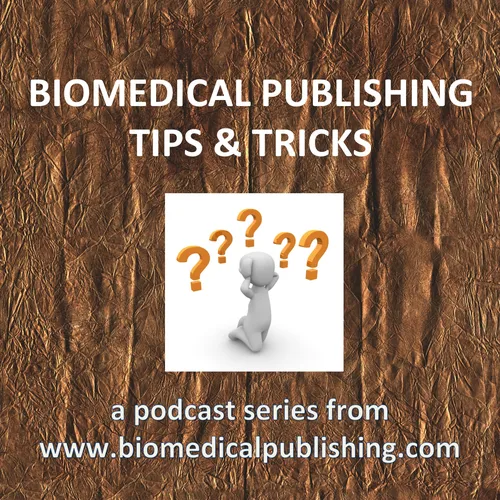
Biomedical Publishing Podcast
This is the podcast from biomedicalpublishing.com. We will guide you through the process of overcoming writer's block so you can produce scientific papers of good quality and get them published.
- Update frequency
- every 6 days
- Average duration
- 9 minutes
- Episodes
- 51
- Years Active
- 2016

Episode 31: a few style tips for medical writing
Not a full grammar school but a few relevant style tips that you should be aware of.

Episode 30: how to perform peer review
You will undoubtedly be asked to perform peer review and then you will probably have some worries about this. This episode will guide you through the process.

Episode 29: how to build an editorial
There are two kinds of editorials, and this podcast will explain how to write the editorial that is not written by the editor.

Episode 28: how to build a case report
A case report may be one of the easier articles to write. There is a published guideline on the writing of a case report (www.care-statement.org) and some additional tricks and comments that you will…

Episode 27: how to build a narrative review
The narrative review may be a difficult article to write for the novice science writer. The reason is that it does not follow explicit rules or guidelines. There are a few tricks, however, so listen …

Episode 26: how to build a protocol article
It may be important and a very good idea to publish a protocol article with its statistical analysis plan before enrolment of patients in the study. This will secure the analysis plan and ensure that…

Episode 25: your image is in the reference list
You may not realize how important this is, but your image as a researcher is actually reflected in your reference list. If you make errors in the reference list, then the editor and peer reviewers ma…

Episode 24: publication of research protocols
Publication of research protocols or more importantly the statistical analysis plan is important to ensure research integrity. There are various solutions for this. Hear the podcast and find out how …

Episode 23: how many can be corresponding author
It may seem like a strange question but it has nevertheless been an important issue for especially Chinese authors. Hear the podcast and find out why.

Episode 22: everybody should get an ORCID ID
There are many good reasons to obtain a unique personal author identifier and the ORCID ID is the solution for that. Go to orcid.org and register now. It is simple and free of charge, and you will ge…

Episode 21: order of authors in the byline
Typically the forst author has written the first draft of the paper and the last author is the most senior of the supervisors. But what about the middle-authors, does their place in the byline have a…

Episode 20: how many can author a scientific paper
In the biomedical sciences we use the ICMJE criteria for authorship, and if these are followed there is actually no upper limit for the number of authors on a scientific paper as long as all authors …

Episode 19: use of group authorship
There has been a tendency, especially in larger trials, to use a group name in the author byline. With the current clear definitions of authorship the use of a group name in the byline may be a littl…

Episode 18: confidentiality in the review process
It is important to respect secrecy in the review process, both for editors and reviewers but also for authors.

Episode 17: problems with internet references
When you want to refer to a specific webpage in your reference list then there is a risk that the webpage will not be available forever. You can therefore use a smart trick to ensure that your referr…

Episode 16: reference management software
It is popular to use dedicated software for reference management when you write scientific papers. There are, however, both pros and cons.

Episode 15: trial registration
In this issue we discuss various issues of trial registration, including where to register, what to register, and how to find registered studies with a search covering all the available databases. Al…

Episode 14: how to build a systematic review
In this episode we discuss the actual composition of the systematic review. This should follow the PRISMA guidelines where you will find great help.

Episode 13: How to build your original article
This episode will guide you to make an outline of a typical original paper.

Episode 12: How do we get all data published
There are lots of data hidden, which will never get published. This is a serious problem, both ethically and also because it causes substantial publication bias. This episode will discuss this import…